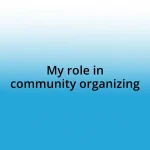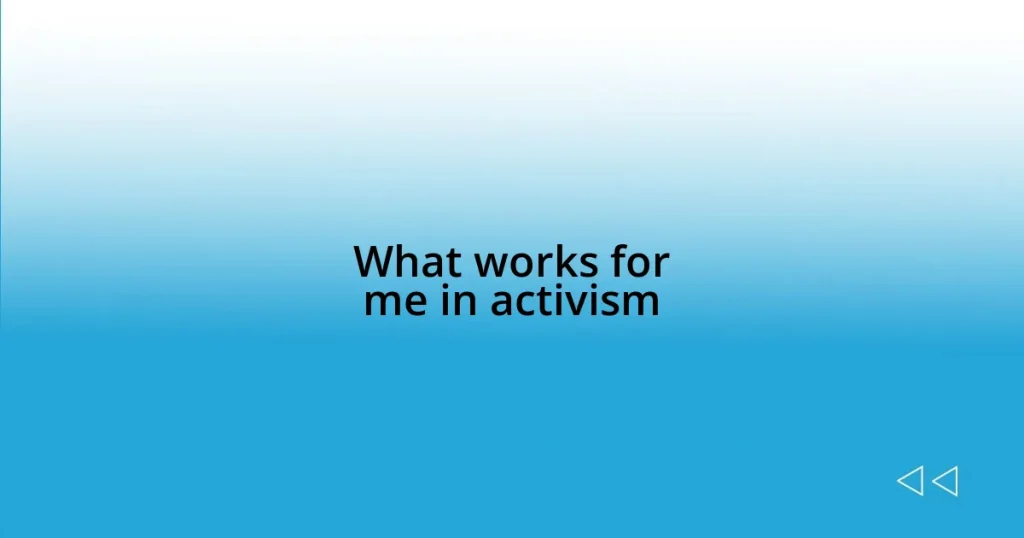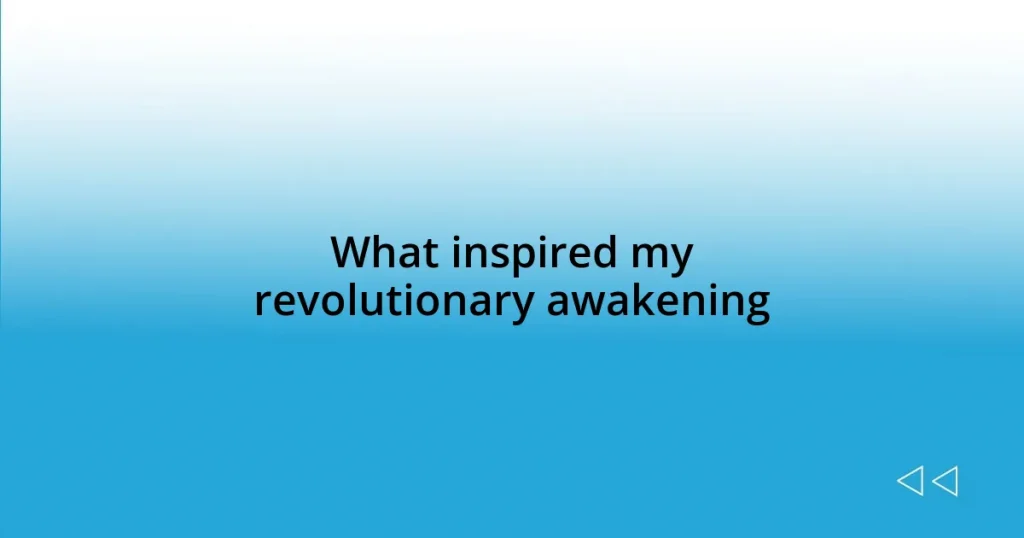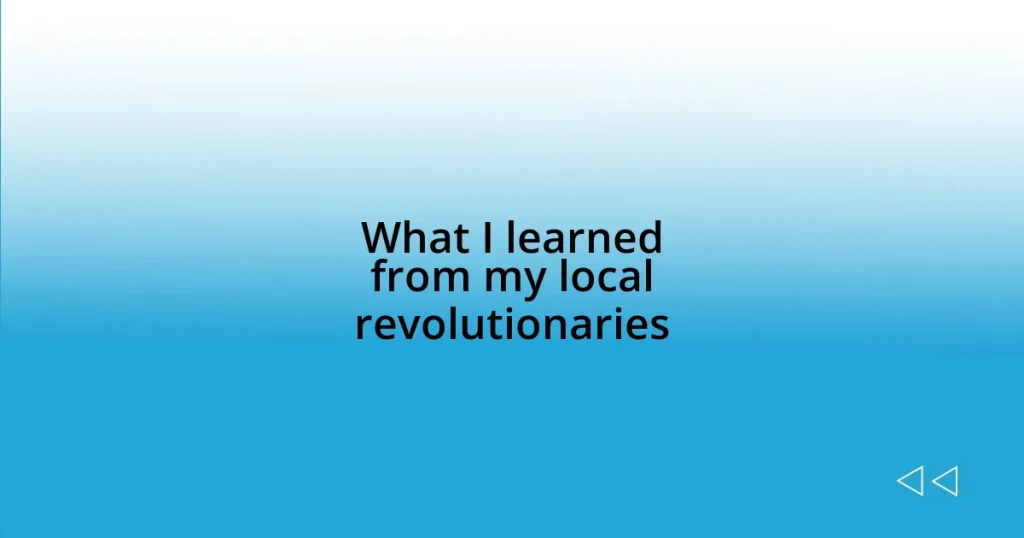Key takeaways:
- Marxist theory emphasizes class struggle, highlighting the disconnect between labor and fulfillment in capitalist societies.
- Key principles like alienation and commodity fetishism reveal how economic systems shape personal and community experiences.
- Engaging in community activism fosters relationships that advocate for collective rights and challenge economic disparities.
- Building supportive networks enhances solidarity and empowers individuals to resist oppressive systems through shared knowledge and collaboration.
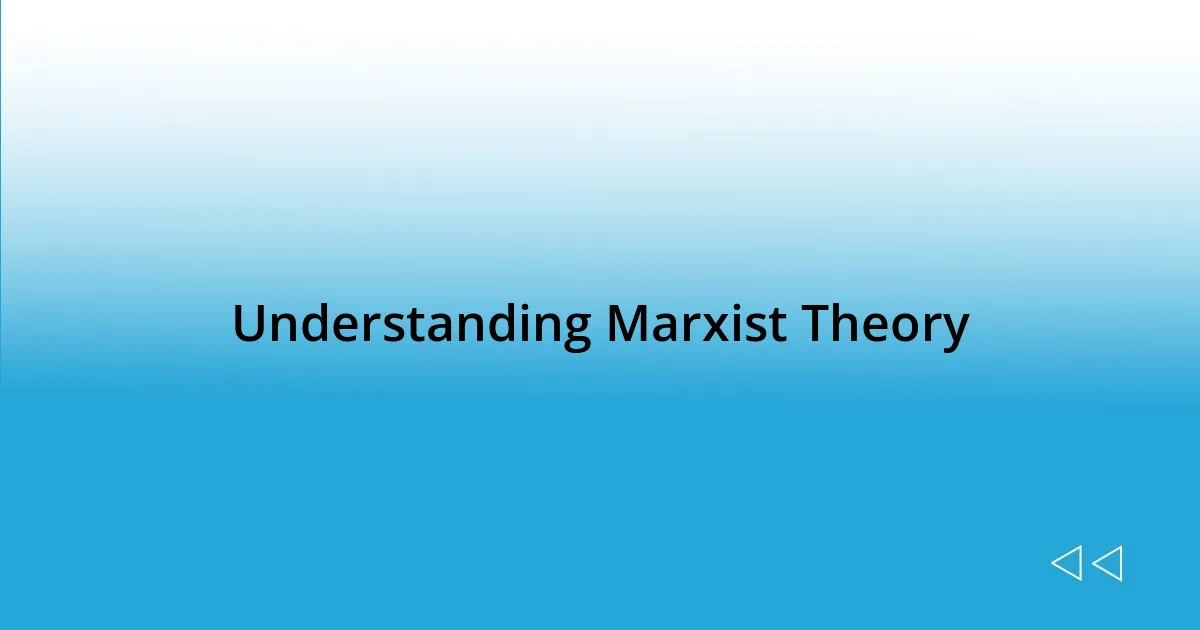
Understanding Marxist Theory
Marxist theory revolves around the idea that society is structured around class struggle, where the bourgeoisie, or capitalists, own the means of production, while the proletariat, or working class, sells their labor. I remember first grappling with this concept in college during a heated debate in philosophy class. I was struck by the realization that our daily lives, even in mundane moments, are deeply intertwined with these economic classes—think about it: how does your work and its compensation reflect this struggle?
At its core, Marxist theory critiques how capitalism leads to the alienation of workers. I felt this personally during a particularly draining job where I counted the hours without feeling any real connection to my work or its outcomes. It prompted me to ask, why do we often feel disconnected from the fruits of our labor? This sense of disconnection—the emotional toll of working hard yet feeling undervalued—is something many people experience, pushing me to think about the broader implications of labor in our lives.
Additionally, the concept of historical materialism, which suggests that material conditions and economic factors influence society’s development, opened my eyes to how our environments shape our identities. I still remember the day I noticed the stark differences in neighborhoods as I traveled through various parts of my city. It fascinated me to see how these spaces reflected the economic divides and social realities. Isn’t it intriguing how our surroundings can tell such vivid stories about our social organization?
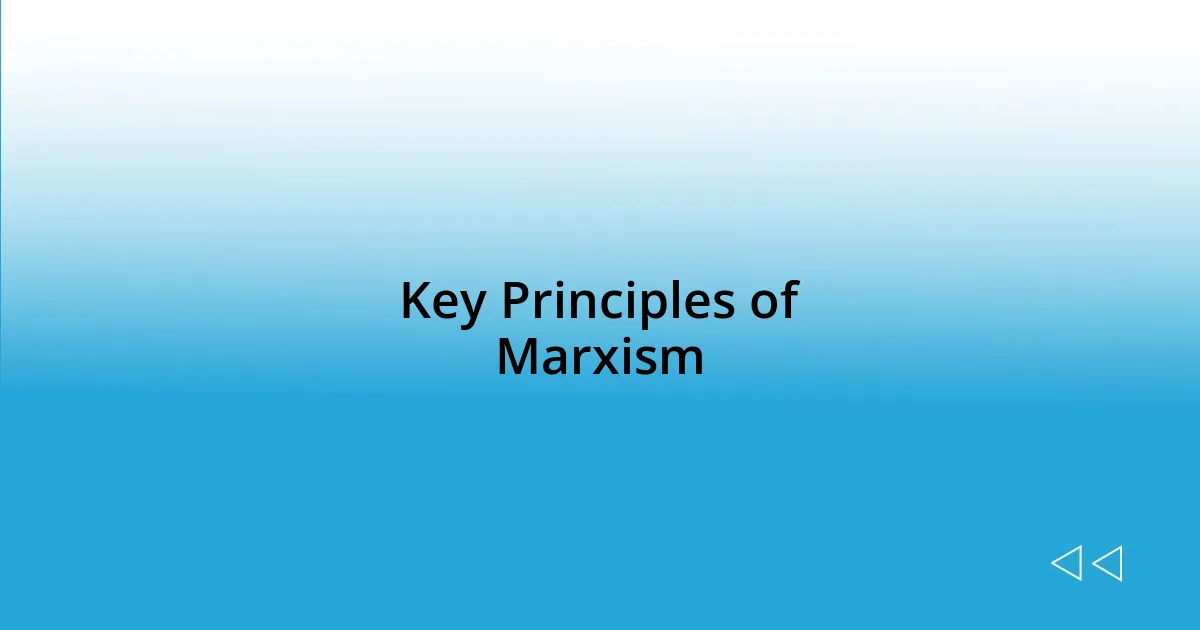
Key Principles of Marxism
Marxism is built upon several key principles that offer a critical lens through which to view society. One that particularly resonates with me is the notion of class struggle. I’ve often felt the tension in workplaces, where the differences between employees and management become starkly apparent. It’s in those moments of disagreement over policy changes or pay raises that you can almost feel the struggle at play—a visible reminder of how class divides manifest in daily interactions.
Here are some essential principles of Marxism:
- Class Conflict: Society is divided into classes, and their interests often clash, primarily between the bourgeoisie and proletariat.
- Alienation: Workers become estranged from their labor, leading to a lack of fulfillment and connection to the products they create.
- Historical Materialism: Development of society is primarily driven by material conditions and economic factors, shaping social institutions and relationships.
- Surplus Value: Capitalists gain profit from the labor of workers, who are compensated less than the value they produce.
- Commodity Fetishism: Social relationships are often mediated through commodities, obscuring the labor that creates them.
Reflecting on these principles has deepened my understanding of my own work experiences. For instance, when I was employed in retail, I often felt that employees were treated as mere resources for profit rather than valued individuals. It left me wondering how many of us function in systems that prioritize profit over people, pushing us further into an ongoing cycle of alienation. Seeing this dynamic play out in real time reinforced my belief in the importance of recognizing these underlying structures in our everyday lives.

Analyzing Capitalism in Daily Life
When I think about capitalism’s role in daily life, I can’t help but consider how consumer culture shapes our decisions. There was a time when I’d eagerly await the next big sale, only to feel a twinge of emptiness afterward. I realized that this cycle of buying and discarding wasn’t just a habit; it reflects a deeper truth about how capitalism thrives on our incessant desire for newness. This awareness prompted me to question what truly brings me fulfillment: momentary possessions or lasting experiences?
Moreover, observing the hustle and bustle of my city’s marketplaces reveals the stark realities of economic disparity. I vividly remember visiting a local farmers’ market and feeling a sense of community. Yet, just a few blocks away, I saw a stark contrast in the big-box retailers. This dichotomy often emphasizes how capitalism dictates access to resources. It made me reflect on how locations dictate opportunities—who can afford to shop where, and what that means for the broader community’s health and wellbeing.
Finally, we can analyze how capitalism affects our work-life balance. During a particularly busy season at my job, I noticed how I was pushed to overproduce. My dedication resulted in late nights and burnt-out energy, which left me questioning the price of my commitment. I pondered whether this relentless push for more productivity aligns with my values. It struck me that we often trade our time and health for profits that benefit a select few. Isn’t it fascinating—and concerning—how deeply embedded these dynamics are in our lives?
| Aspect | Capitalism’s Impact |
|---|---|
| Consumer Culture | Creates ongoing desires for new products, fostering a sense of emptiness post-purchase. |
| Economic Disparity | Differences in access to resources based on neighborhood influence community wellbeing. |
| Work-Life Balance | Pushing employees for productivity often sacrifices health and personal values. |

Applying Marxism to Consumer Choices
When it comes to consumer choices, I’ve found that applying Marxist theory offers a revealing perspective on my shopping habits. I remember a time when I felt a surge of excitement during a massive sale—only to realize later that it was shallow satisfaction. This experience led me to examine how commodity fetishism plays a role in my decisions, as I began to see how the allure of products often overshadows the labor behind them. I started asking myself: what am I truly valuing when I purchase something? Is it the item itself, or is it the status and identity that come with it?
I also recall a moment at a local thrift store, rummaging through clothes that had been discarded. I felt a sense of connection to the previous owners and considered the stories behind those items. It struck me how each garment represented labor that had built someone else’s life, yet here it was, sold at a fraction of its worth. This reality made me realize how consumer choices can reinforce class structures. When I buy second-hand, I’m not just shopping; I’m participating in a system that challenges the idea of disposable consumerism—an act that can foster a sense of community and sustainability.
Reflecting on my grocery shopping trips, I can’t help but feel the weight of class conflict. I often find myself comparing products at the upscale grocery store with those at a budget market. The differences in quality and price are stark, and I started to wonder: why should access to fresh, healthy food be dictated by income? This experience opened my eyes to how economic realities shape our meal choices and ultimately our health. The Marxist lens reminds me that even the simplest decisions—like what to cook for dinner—are influenced by the deeper structures of our economic system.
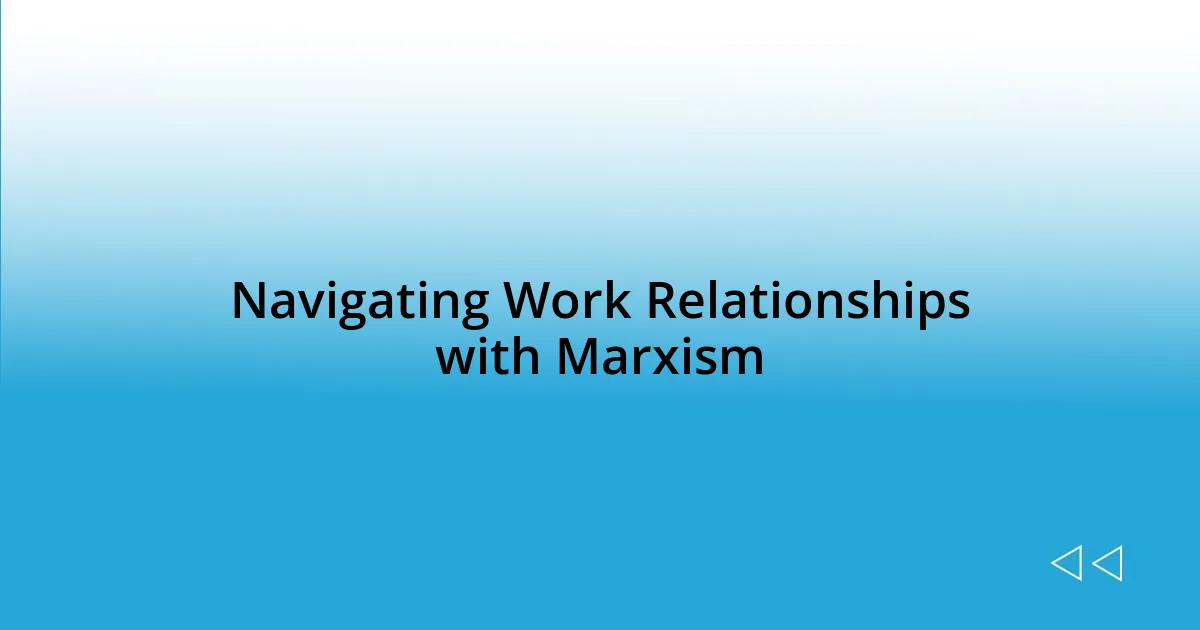
Navigating Work Relationships with Marxism
Navigating work relationships through the lens of Marxism has profoundly shaped my understanding of power dynamics in the workplace. When I began to observe my colleagues, I realized how hierarchical structures create a sense of competition rather than collaboration. One day, during a team project, I noticed how my manager’s demands overshadowed my team’s input, leaving many feeling undervalued. I couldn’t help but wonder: how often do we sacrifice our voices to appease authority figures? This reflection led me to advocate for more inclusive meetings, fostering a space where everyone’s ideas could flourish.
Another revealing moment occurred during a company retreat, where discussions about profit margins dominated. I shared my concern about how the relentless emphasis on financial success was impacting team morale. I felt a mixture of fear and hope, grappling with the idea that speaking out might jeopardize my standing. Yet, as I expressed my views, several colleagues nodded in agreement. It dawned on me that Marxism isn’t solely about critique; it’s about inspiring change among peers. Why do we settle for environments that prioritize profit over people?
I also came to understand the emotional labor many of us undertake—something rarely acknowledged in traditional workplace hierarchies. For instance, as I watched my coworkers take on the extra burden of supporting colleagues’ mental health, I felt a sense of camaraderie mixed with frustration. It led me to question: shouldn’t emotional wellbeing be part of our company values? This experience solidified my belief in fostering relationships grounded in mutual respect and care, transforming the workplace from a battleground of power into a community of support and growth.
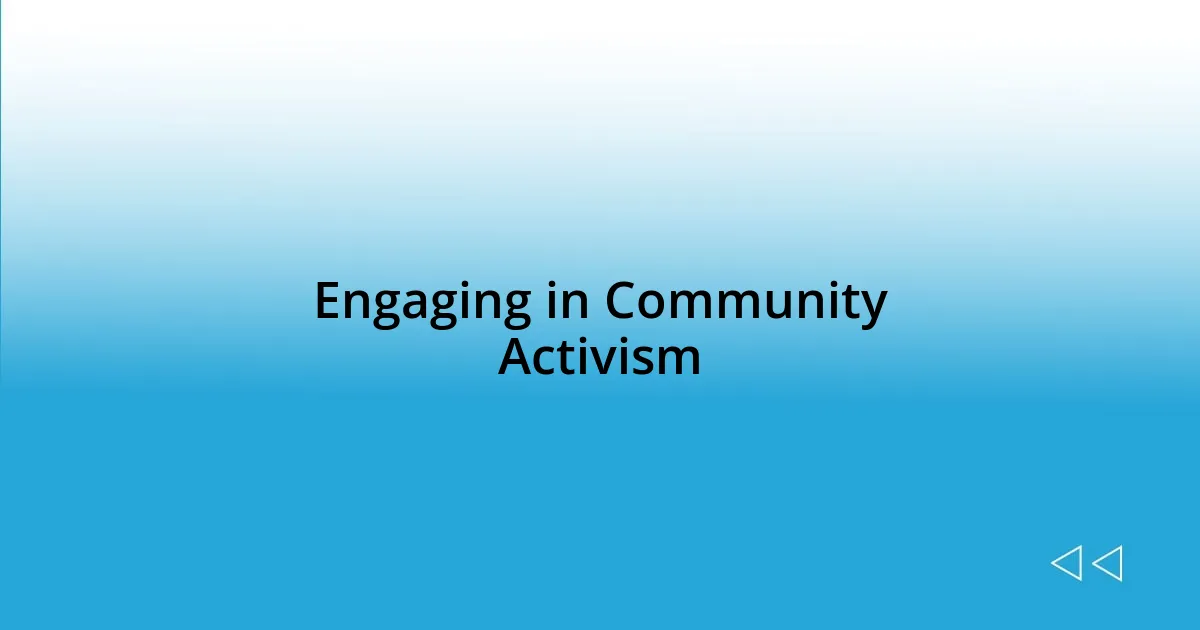
Engaging in Community Activism
Engaging in community activism has become a meaningful way for me to apply Marxist theory in my daily life. I remember the first time I joined a local organizing meeting focused on affordable housing. The energy in the room was infectious, but I was struck by the heartbreaking stories of families struggling to keep their homes. Listening to their experiences made me question the very fabric of our society: how can people work tirelessly yet still struggle to make ends meet? This realization pushed me to take action, not just as an individual but as part of a collective striving for change.
One specific initiative that resonated with me was a neighborhood clean-up event I participated in recently. As we picked up litter together, it wasn’t just about beautifying our surroundings; it felt like a rebellion against the neglect that often plagues lower-income areas. I exchanged ideas with fellow activists about how we could advocate for better city services and public spaces. It made me realize that community activism isn’t just action—it’s about building relationships and advocating for collective rights. I couldn’t help but wonder: how powerful could we be if we consistently nurtured these connections?
I also find street fairs to be a microcosm of community engagement. At a recent event, I volunteered at a booth promoting local artisans and their handmade crafts. It was remarkable to see how these small business owners were weaving narratives of resistance against mass production and consumerism. I felt a sense of pride showcasing their work while thinking about the labor and love that went into each piece. This experience reaffirmed that activism at the community level is about elevating voices and stories that often go unheard, reminding me that change begins with us, one conversation—and one action—at a time.
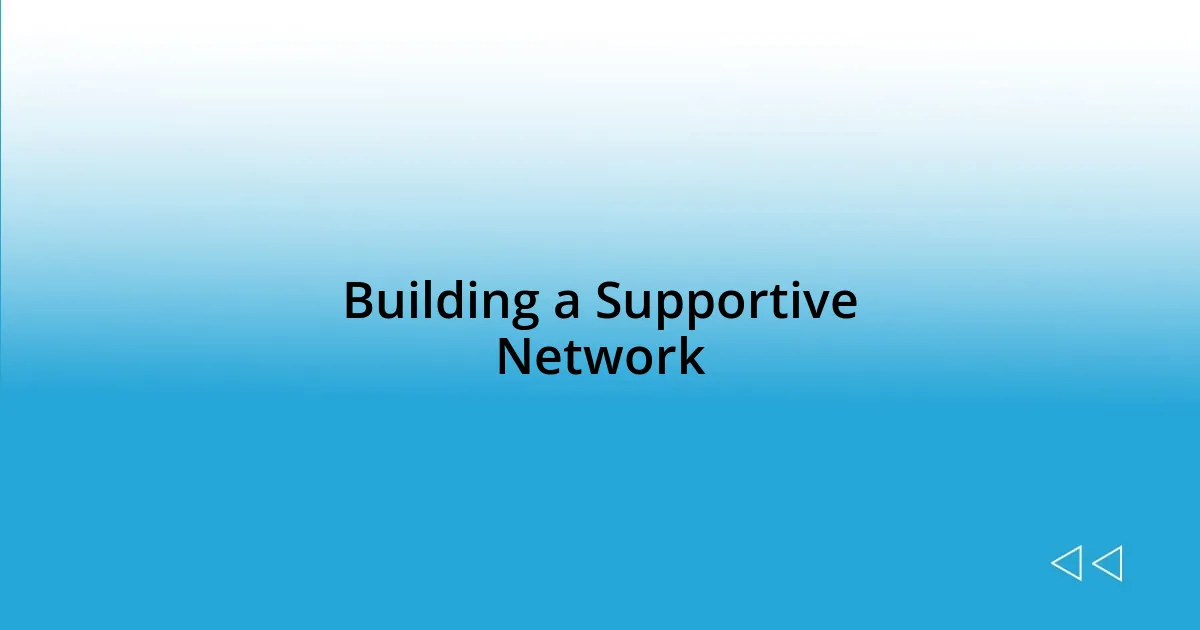
Building a Supportive Network
Building a supportive network can be transformative, especially when viewed through a Marxist lens. I recall a gathering I initiated with friends who shared similar values around social justice. We met weekly, discussing everything from local politics to personal struggles. It felt liberating to voice our concerns in a space that encouraged open dialogue. I couldn’t help but think: how often do we create circles where vulnerability and solidarity thrive? This informal network became not just a source of encouragement but also a launching pad for action.
While attending a workshop focused on mutual aid, I witnessed the power of collective resources. Participants shared their expertise, creating a mosaic of skills that benefited everyone. I volunteered to lead a session on budgeting basics, and I was shocked at the warmth and gratitude that filled the room. People were genuinely eager to learn from one another, and I realized that sharing knowledge was a form of resistance against the economic systems that try to pit us against each other. Isn’t it amazing how empowering one another can ignite real change in our communities?
Moreover, I’ve found that forming alliances with individuals from diverse backgrounds enriches my understanding of systemic issues. I recently collaborated with some local artists for a project that aimed to highlight the narratives of marginalized communities. The conversations were raw and enlightening. Why do we tend to segregate ourselves into echo chambers? In these moments of collaboration, I felt every voice mattered, reminding me that a strong network isn’t just about support—it’s about amplifying the chorus of dissent against oppression.





